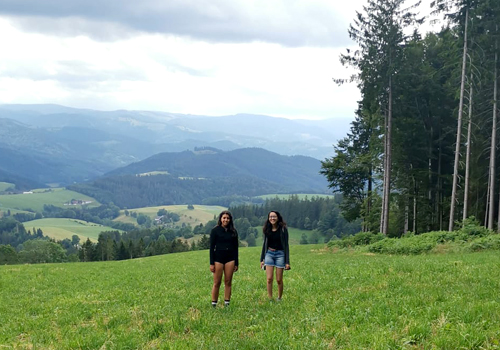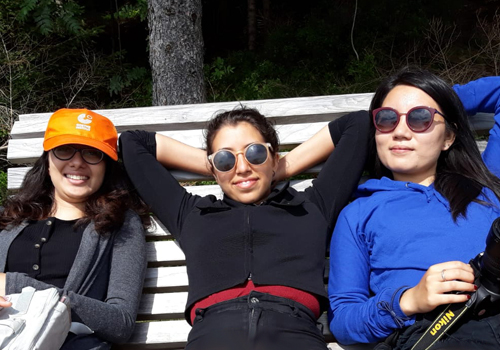Energy-saving houses, solar factories, rainwater collection, more than 400 kilometres of cycling paths and even a zero-emissions hotel: these are just some of the ways the city of Freiburg, in south-western Germany, is leading the world in sustainable city-building.
This past summer, four undergraduate students from the Faculty of Arts & Science experienced the green city firsthand through internships with some of the city’s most innovative sustainability organizations.
The internships were facilitated by the Department of Germanic Languages & Literatures’ iPRAKTIKUM program and its latest initiative, futurGenerator. Initiated two years ago, the program aims to provide U of T students across disciplines with impactful, work-related learning experiences that also offer a chance to practice German language skills with native speakers.
“We know how transformative these kinds of global experiences can be,” says Stefan Soldovieri, associate professor of German and one of the leads of the iPRAKTIKUM program. “Students come back energized, more engaged in their academic work and more aware of their place in the world.”
From ecological tourism to food sovereignty and beyond

Photo: Savannah Bein.
Four A&S undergrads spent 10 weeks in Freiburg working with organizations whose mandates range from researching sustainable food systems to conducting tours of eco-friendly sites and projects around the city.
Gabriella Zhao and Tanvi Ghokhale interned with an organization called Zusammen Leben — German for “living together” — which promotes social integration between refugees, migrants and people living in Germany through eco-friendly initiatives like community gardens, cafes and sustainable food production projects.
“I was really inspired by the city and influenced by the eco-friendly people I met during my internship,” says Zhao, a fourth-year member of Woodsworth College majoring in English literature and German studies, whose internship included creating an information booth for the city’s annual agricultural festival.
“Freiburg really showed me how a city can operate efficiently while still being environmentally sustainable.”
Savannah Bein was equally invigorated by her summer in Freiburg. A fourth-year student majoring in environmental studies with minors in French and German, she is also an undergraduate fellow at the School of Cities.
“I learned to really embrace my setting in the Black Forest region,” said the member of St. Michael’s College. “I worked outdoors all day every day, I biked everywhere and I learned a lot about gardening through my job.”
Bein interned with Agronauten, an organization that researches regional economies and food sovereignty with the aim of promoting ecological approaches to agriculture.
She says the internship had a profound effect on the future direction of her studies and career.
“I was already interested in environmental issues,” says Bein, “but the internship really set in stone that this is what I’d like to do with my future and that there are a lot of enjoyable ‘green careers’ out there.”
Sustainability internships coincide with growing climate crisis awareness
The Freiburg internships could not have come at a more fortuitous time, as a growing youth climate activism movement gains traction around the world.
Third-year Rotman Commerce student Lucy Hawkes says she felt lucky to attend one of the #FridaysForFuture protests in Freiburg.
“It opened my eyes to the amount of awareness being raised in Europe by young citizens,” says Hawkes, who is a member of Victoria College. “We’ve since noticed a spread of this movement into the Toronto area, which has been very cool to see.”
Asked whether she’d recommend her experience abroad to other students, Hawkes is unequivocal. “Stepping out of your comfort zone and being independent is crucial to figuring out what you want to do with your life and what your place in the world is,” she says.
iPRAKTIKUM opportunities expanding to Berlin in 2020

Photo: Savannah Bein.
The benefits of the iPRAKTIKUM internship aren’t only for students.
“It’s a win-win-win scenario,” says Helena Juenger, graduate assistant in the Department of Germanic Languages & Literatures, and one of the leads of the iPRAKTIKUM project.
“It’s good for students, good for the organizations who host internships and beneficial to our department in terms of achieving our curricular goals,” says Juenger. “Employers clearly value the ‘global competence’ of U of T students, who are a highly international and multi-ethnic group — a plus for any organization.”
Soldovieri says iPRAKTIKUM will launch a second hub in Berlin in the summer of 2020, with organizations working in the areas of urban mobility and smart cities.
The iPRAKTIKUM program is open to all U of T students, regardless of department or program, if they speak some German or are willing to learn.
This year’s initiative of the program was supported by Advancing Teaching & Learning in Arts & Science (ATLAS), the Dean’s International & Indigenous Initiatives Fund (DIIIF) and the Career Ready Fund (CRF) from the Ministry of Advanced Education & Skills Development.

